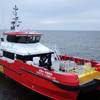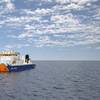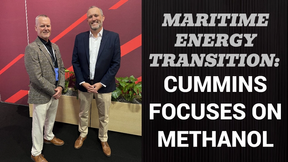Faster Single-Hull Phase-Out Mulled
"We should, therefore, be hopeful that the good spirit of co-operation, which prevailed during the week, will also be demonstrated in December so that IMO would be able, once again, to do what it was founded to do, that is to encourage and facilitate the adoption of global standards to regulate shipping, and that it does so on the basis of realistic, pragmatic and well-balanced consideration of items on its agenda," he added. At its 49th regular session, the MEPC also finalized a new proposed draft convention on the management of ballast water and agreed ship recycling guidelines. The MEPC met at IMO headquarters in London, from 14-18 July, under the chairmanship of Mr. Andreas Chrysostomou (Cyprus) Single-hull tankers - proposals to amend MARPOL 73/78 The MEPC held extensive discussions in a Working Group and in plenary in relation to proposals to amend MARPOL 73/78, submitted by all the fifteen Member States of the European Union, calling for further acceleration of the phase-out timetable for single-hull tankers, an immediate ban on the carriage of heavy grades of oil in single-hull tankers and for the Condition Assessment Scheme (adopted in 2001 in the wake of the 1999 Erika incident) to be applied to tankers of 15 years of age and above.
The outcome of the discussions was as follows, with further discussion scheduled for the extra MEPC session in December, which will consider, with a view to adoption, the proposed amendments to MARPOL 73/78: - The MEPC agreed on an accelerated phase-out for Category 1 tankers (pre-MARPOL tankers). This would bring forward the final phasing-out date for these tankers to 2005, from 2007. - The MEPC discussed the proposal to bring forward the phasing-out of category 2 and 3 tankers (MARPOL tankers and smaller tankers) to 2010, from 2015. While there was substantial support in principle to the 2010 deadline, there was also concern relating to the phase-out of tankers of less than 20 years old in 2010 that this would lead to. There was a suggested proposal, for further consideration in December, which could see the operational life of these tankers extending to 2015 or until the ship reaches a specified age (e.g. 20, 23 or 25 years), subject to satisfactory results from the Condition Assessment Scheme (CAS). - The MEPC agreed, in principle, that the CAS should be applied to single-hull tankers of 15 years, or older (as against being applicable to all Category 1 vessels continuing to trade after 2005 and all Category 2 vessels after 2010.) The MEPC agreed to circulate the proposed CAS amendments with a view to consideration for adoption at the extra session in December. - The MEPC noted the proposed consequential enhancements to the CAS scheme which would be needed. The Committee further noted that in order to adequate CAS to future challenges such as its possible application to double-hull tankers or enhanced requirements for tankers carrying heated cargoes, intensive work is needed. It noted with appreciation the offer by the United Kingdom would host an informal meeting on these issues with industry and interested Administrations, prior to the extra MEPC meeting in December. - The MEPC considered the proposed draft regulation on the carriage of Heavy Grades of Oil (HGO) in single-hull tankers, which would ban the carriage of HGO in single-hull tankers. The MEPC agreed on the need for further technical discussion at the December meeting of the proposed new regulation 13H on Prevention of oil pollution when carrying heavy grades of oil, in particular in relation to the physical properties of heavy grades of oil (including their definition, in relation to density and/or kinematic viscosity) and in pollution combating. - The MEPC noted the differing views on the issue of tankers carrying HGO engaged in domestic trades, regarding possible exemptions for tankers on local voyages and agreed this was a policy matter for a decision later. - The MEPC agreed that the Informal Group of Experts should be re-established to review the impact of the proposals discussed at this session. Extra session of the Committee (MEPC 50) The extra session of the Committee will be held as MEPC 50 on 1 and 4 December 2003, during the 23rd IMO Assembly, which meets from 24 November to 5 December 2003. Proposal for a West European PSSA The MEPC approved in principle a proposal for Belgium, France, Ireland, Portugal, Spain and the United Kingdom to designate a Particularly Sensitive Sea Area (PSSA) to cover a wide sea area west of these countries, subject to the area being reduced to bring the easterly line off the Shetlands Isles to 00 longitude. The States proposing the measure withdrew an earlier proposal to ban carriage of heavy fuel oil in single hull tankers in the PSSA and instead agreed that the Associated Protective Measures linked to the PSSA would, at this stage, concern a proposed 48-hour reporting rule for ships carrying certain cargoes entering the PSSA. This measure would be referred to the Sub-Committee on Safety of Navigation (NAV), meeting mid-2004, for consideration. Delegations who had raised potential legal issues relating to the application of the PSSA were invited to refer these concerns to the Legal Committee, which is scheduled to meet in October 2003 and April 2004. The Western European Waters PSSA will be considered by the Committee for potential final designation at the regular session of MEPC in October 2004. Great Barrier Reef PSSA extended The MEPC approved in principle a proposal from Australia and Papua New Guinea for the extension of the Great Barrier Reef PSSA to cover Torres Strait Region, together with the associated protective measures, subject to clarification on the compulsory pilotage measures at NAV 50 in 2004. The extended PSSA will be expected to be designated at a regular session of MEPC in October 2004. Paracas National Reserve PSSA adopted The MEPC adopted the Paracas National Reserve, Peru, as a PSSA. Including the Paracas PSSA, there are now six designated PSSAs - the others being: the Great Barrier Reef, Australia; the Sabana-Camagüey Archipelago in Cuba; Malpelo Island, Colombia; Around the Florida Keys, United States; and the Wadden Sea (Denmark, Germany, Netherlands).














